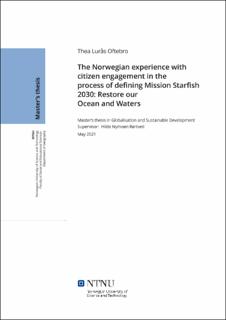Citizen engagement though a mission-oriented approach is a key novelty in Horizon Europe,
the European Commission’s new framework programme for research and innovation. Missions
are the European Union’s (EU) commitment to solve some of the major challenges facing the
world today. They can be found within five mission areas identified within the framework
programme. This thesis explores the Norwegian experience with citizen engagement in the
process of defining Mission Starfish 2030: Restore our Ocean and Waters.
This mission is found within the mission area: Healthy oceans, seas, coastal and inland waters.
This thesis relies on document analysis and interviews with key informants to answer the
following research questions: 1) What has been done to include the views and opinions of
Norwegian citizens in the definition of Mission Starfish and what are the experiences of those
involved in organizing these activities? 2) How does those involved in organizing the citizen
engagement activities in Norway interpret the purpose of these activities? 3) What does the
European Commission want to achieve with citizen engagement in Horizon Europe? 4) What
are the areas of improvements in order to make citizen engagement more efficient and
influential in the future?
There have been many citizen engagement activities taking place on both national and EU
level in relation to the definition of the EU missions. Although the process of defining
Mission Starfish was largely affected by the outbreak of the COVID-19 pandemic, there were
two citizen engagement events taking place in Norway. There was an online survey followed
by an online workshop. The organizers of the event highlight three key reasons for why it is
important to have citizen engagement: to legitimate the process, mobilize citizens and create
better outcomes. This thesis explores how citizens have gained greater role within the
framework programmes throughout the years. Despite this, it is not always clear what the
European Commission want to achieve or what role citizen engagement is supposed to serve.
This thesis highlights four areas of improvement to make citizen engagement more efficient
and influential, these can be summarized as: Use of available expertise, early engagement,
better communication and a broader range of participants.
